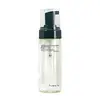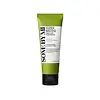What's inside
What's inside
 Key Ingredients
Key Ingredients

 Benefits
Benefits

 Concerns
Concerns

 Ingredients Side-by-side
Ingredients Side-by-side

Water
Skin ConditioningDipropylene Glycol
HumectantDisodium Laureth Sulfosuccinate
CleansingDisodium Cocoyl Glutamate
CleansingCoco-Glucoside
CleansingPolyglyceryl-10 Myristate
Skin ConditioningCamellia Japonica Flower Extract
EmollientCentella Asiatica Extract
CleansingSodium Hyaluronate
HumectantLonicera Japonica Flower Extract
Skin ConditioningMelaleuca Alternifolia Leaf Extract
PerfumingSalvia Officinalis Leaf Extract
CleansingCaprylic/Capric Triglyceride
MaskingCetyl Ethylhexanoate
EmollientEthylhexyl Palmitate
EmollientHydrolyzed Hyaluronic Acid
HumectantHydroxypropyltrimonium Hyaluronate
Sodium Hyaluronate Crosspolymer
HumectantSodium Acetylated Hyaluronate
HumectantMadecassoside
AntioxidantMadecassic Acid
Skin ConditioningAsiaticoside
AntioxidantAsiatic Acid
Skin ConditioningButylene Glycol
HumectantCitric Acid
BufferingCaprylyl Glycol
EmollientHydroxyacetophenone
AntioxidantPentylene Glycol
Skin ConditioningSalix Alba Bark Extract
AstringentPolyquaternium-67
Propanediol
SolventEthylhexylglycerin
Skin ConditioningDisodium EDTA
1,2-Hexanediol
Skin ConditioningWater, Dipropylene Glycol, Disodium Laureth Sulfosuccinate, Disodium Cocoyl Glutamate, Coco-Glucoside, Polyglyceryl-10 Myristate, Camellia Japonica Flower Extract, Centella Asiatica Extract, Sodium Hyaluronate, Lonicera Japonica Flower Extract, Melaleuca Alternifolia Leaf Extract, Salvia Officinalis Leaf Extract, Caprylic/Capric Triglyceride, Cetyl Ethylhexanoate, Ethylhexyl Palmitate, Hydrolyzed Hyaluronic Acid, Hydroxypropyltrimonium Hyaluronate, Sodium Hyaluronate Crosspolymer, Sodium Acetylated Hyaluronate, Madecassoside, Madecassic Acid, Asiaticoside, Asiatic Acid, Butylene Glycol, Citric Acid, Caprylyl Glycol, Hydroxyacetophenone, Pentylene Glycol, Salix Alba Bark Extract, Polyquaternium-67, Propanediol, Ethylhexylglycerin, Disodium EDTA, 1,2-Hexanediol
Camellia Sinensis Leaf Water 62%
MaskingGlycerin
HumectantWater
Skin ConditioningPotassium Cocoyl Glycinate
Lauryl Glucoside
CleansingCoco-Glucoside
CleansingAcrylates Copolymer
Sodium Cocoyl Isethionate
Cleansing1,2-Hexanediol
Skin ConditioningSalix Alba Bark Water
AstringentSalix Alba Bark Extract
AstringentCentella Asiatica Extract
CleansingCentella Asiatica Leaf Extract
Skin ConditioningMelia Azadirachta Leaf Extract
Skin ConditioningMelia Azadirachta Flower Extract
Skin ConditioningCalamine
AbsorbentCamellia Sinensis Leaf Powder
ExfoliatingMelaleuca Alternifolia Leaf Powder
AbrasiveButylene Glycol
HumectantSodium Hyaluronate
HumectantAllantoin
Skin ConditioningMadecassic Acid
Skin ConditioningAsiaticoside
AntioxidantAsiatic Acid
Skin ConditioningMadecassoside
AntioxidantCocos Nucifera Oil
MaskingCoco-Caprylate/Caprate
EmollientCaprylyl Glycol
EmollientGlyceryl Undecylenate
EmollientPolyglyceryl-10 Myristate
Skin ConditioningPotassium Cetyl Phosphate
EmulsifyingLauric Acid
CleansingMannan
Lactobionic Acid
BufferingCitric Acid
BufferingTriethoxycaprylylsilane
Methylpropanediol
SolventBenzyl Glycol
SolventEthylhexylglycerin
Skin ConditioningRaspberry Ketone
MaskingParfum
MaskingCamellia Sinensis Leaf Water 62%, Glycerin, Water, Potassium Cocoyl Glycinate, Lauryl Glucoside, Coco-Glucoside, Acrylates Copolymer, Sodium Cocoyl Isethionate, 1,2-Hexanediol, Salix Alba Bark Water, Salix Alba Bark Extract, Centella Asiatica Extract, Centella Asiatica Leaf Extract, Melia Azadirachta Leaf Extract, Melia Azadirachta Flower Extract, Calamine, Camellia Sinensis Leaf Powder, Melaleuca Alternifolia Leaf Powder, Butylene Glycol, Sodium Hyaluronate, Allantoin, Madecassic Acid, Asiaticoside, Asiatic Acid, Madecassoside, Cocos Nucifera Oil, Coco-Caprylate/Caprate, Caprylyl Glycol, Glyceryl Undecylenate, Polyglyceryl-10 Myristate, Potassium Cetyl Phosphate, Lauric Acid, Mannan, Lactobionic Acid, Citric Acid, Triethoxycaprylylsilane, Methylpropanediol, Benzyl Glycol, Ethylhexylglycerin, Raspberry Ketone, Parfum
 Reviews
Reviews

Ingredients Explained
These ingredients are found in both products.
Ingredients higher up in an ingredient list are typically present in a larger amount.
1,2-Hexanediol is a synthetic liquid and another multi-functional powerhouse.
It is a:
- Humectant, drawing moisture into the skin
- Emollient, helping to soften skin
- Solvent, dispersing and stabilizing formulas
- Preservative booster, enhancing the antimicrobial activity of other preservatives
Asiatic Acid is a major component of Centella Asiatica Extract. It has wound-healing, anti-inflammatory, and antioxidant properties.
Studies show Asiatic Acid is able to block the pathway for skin inflammation receptors, helping to soothe skin.
As an antioxidant, asiatic acid helps protect our skin against damaging environmental factors.
Learn more about Asiatic AcidAsiaticoside comes from the super popular skin-soothing ingredient, Centella asiatica. It is one of four active compounds found in the extract of Centella Asiatica.
Asiaticoside is an antioxidant and helps with wound healing. It has been shown to increase antioxidant activity during the wound healing process.
Butylene Glycol (or BG) is used within cosmetic products for a few different reasons:
Overall, Butylene Glycol is a safe and well-rounded ingredient that works well with other ingredients.
Though this ingredient works well with most skin types, some people with sensitive skin may experience a reaction such as allergic rashes, closed comedones, or itchiness.
Learn more about Butylene GlycolCaprylyl Glycol is a humectant and emollient, meaning it attracts and preserves moisture.
It is a common ingredient in many products, especially those designed to hydrate skin. The primary benefits are retaining moisture, skin softening, and promoting a healthy skin barrier.
Though Caprylyl Glycol is an alcohol derived from fatty acids, it is not the kind that can dry out skin.
This ingredient is also used as a preservative to extend the life of products. It has slight antimicrobial properties.
Learn more about Caprylyl GlycolCentella Asiatica Extract (Centella) is derived from an herb native to Southeast Asia. It is famous for its anti-inflammatory and soothing properties.
Centella is rich in antioxidants and amino acids, such as Madecassic Acid and Asiaticoside.
Studies show the compounds in centella help with:
The combination of all these properties makes centella effective at soothing, hydrating, and protecting the skin.
Other great components of centella include Vitamin A, vitamin C, several B vitamins, and Asiatic Acid.
Fun fact: Centella has been used as a medicine and in food for many centuries. As a medicine, it is used to treat burns, scratches, and wounds.
Learn more about Centella Asiatica ExtractCitric Acid is an alpha hydroxy acid (AHA) naturally found in citrus fruits like oranges, lemons, and limes.
Like other AHAs, citric acid can exfoliate skin by breaking down the bonds that hold dead skin cells together. This helps reveal smoother and brighter skin underneath.
However, this exfoliating effect only happens at high concentrations (20%) which can be hard to find in cosmetic products.
Due to this, citric acid is usually included in small amounts as a pH adjuster. This helps keep products slightly more acidic and compatible with skin's natural pH.
In skincare formulas, citric acid can:
While it can provide some skin benefits, research shows lactic acid and glycolic acid are generally more effective and less irritating exfoliants.
Most citric acid used in skincare today is made by fermenting sugars (usually from molasses). This synthetic version is identical to the natural citrus form but easier to stabilize and use in formulations.
Read more about some other popular AHA's here:
Learn more about Citric AcidCoco-Glucoside is a surfactant, or a cleansing ingredient. It is made from glucose and coconut oil.
Surfactants help gather dirt, oil, and other pollutants from your skin to be rinsed away.
This ingredient is considered gentle and non-comedogenic. However, it may still be irritating for some.
Learn more about Coco-GlucosideEthylhexylglycerin (we can't pronounce this either) is commonly used as a preservative and skin softener. It is derived from glyceryl.
You might see Ethylhexylglycerin often paired with other preservatives such as phenoxyethanol. Ethylhexylglycerin has been found to increase the effectiveness of these other preservatives.
Madecassic Acid is a major component of Centella Asiatica Extract. It has anti-inflammatory and antioxidant properties.
It is a triterpenoid, meaning it naturally acts as an antioxidant. Antioxidants protect your skin against damage from environmental factors such as pollution and UV.
Studies show Madecassic Acid helps soothe the skin due to its ability to block inflammation pathways.
Learn more about Madecassic AcidMadecassoside comes from the super popular skin-soothing ingredient, Centella asiatica. It is one of four active compounds found in the extract of Centella Asiatica.
Madecassoside has antioxidant, anti-inflammatory, and hydrating properties. It contains fatty acids, amino acids, beta-carotene, and phytochemicals.
One study found using Madecassoside with ascorbic acid helped reduce the signs of aging and improved skin hydration.
Learn more about MadecassosidePolyglyceryl-10 Myristate isn't fungal acne safe.
Salix Alba Bark Extract comes from the white willow tree, which is native to Europe and Central Asia.
Salix Alba Bark Extract has often been described as salicylic acid's cousin. This is due to the salicin it contains. However, studies are limited showing salix alba bark to be an effective salicylic acid alternative.
Salicin does have anti-inflammatory and antioxidant properties. It has shown to decrease the formation of inflammatory mediators, such as tumor necrosis factor-α and nuclear factor-kappa B. Salicin also has a mildly exfoliating effect on the skin.
Several other components in salix alba bark extract also contain antioxidant properties, such as flavonoids and polyphenols. Antioxidants may help with anti-aging as they neutralize harmful free-radical molecules.
Willow Bark extract has been used for thousands of years. Ancient civilizations used white willow to help treat pain and fevers.
Learn more about Salix Alba Bark ExtractSodium Hyaluronate is hyaluronic acid's salt form. It is commonly derived from the sodium salt of hyaluronic acid.
Like hyaluronic acid, it is great at holding water and acts as a humectant. This makes it a great skin hydrating ingredient.
Sodium Hyaluronate is naturally occurring in our bodies and is mostly found in eye fluid and joints.
These are some other common types of Hyaluronic Acid:
Learn more about Sodium HyaluronateWater. It's the most common cosmetic ingredient of all. You'll usually see it at the top of ingredient lists, meaning that it makes up the largest part of the product.
So why is it so popular? Water most often acts as a solvent - this means that it helps dissolve other ingredients into the formulation.
You'll also recognize water as that liquid we all need to stay alive. If you see this, drink a glass of water. Stay hydrated!
Learn more about Water